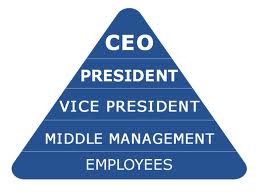 Why Should/Shouldn’t My Church Embrace Change? Part XXXVII
Why Should/Shouldn’t My Church Embrace Change? Part XXXVII
 Since the pyramidal, C.E.O. leadership model is so entrenched in our capitalistic culture, almost every American institutional system is patterned after it. The masses are its foundation; its strong leaders dictate from its apex. President Harry Truman cemented this mentality politically when proclaiming “the buck stops here.” Economically, the minimum waged masses produce the product while the C.E.O. gleans its massive profits. The American dream is to gain wealth, prestige, and power by rising to the top of the pyramid.
Since the pyramidal, C.E.O. leadership model is so entrenched in our capitalistic culture, almost every American institutional system is patterned after it. The masses are its foundation; its strong leaders dictate from its apex. President Harry Truman cemented this mentality politically when proclaiming “the buck stops here.” Economically, the minimum waged masses produce the product while the C.E.O. gleans its massive profits. The American dream is to gain wealth, prestige, and power by rising to the top of the pyramid.
American education, which once sported spinster teachers in one-room schools, now supports a myriad of school administrators who dictate school policy that is also known for not embracing change very quickly. The students, the foundation of this pyramid, are lost under this crushing pyramidal system and mandatory test taking.
Doctors who once owned their “own practices”, did “home visits”, and carried their own little pharmacy in a black doctor’s bag, have been forced to join huge “Health Care Conglomerates” and become their employees. Even a greater pyramidal institution has developed through the Heal Care Insurance Industry and The Affordable Health Care Act, which you now must join by law.
The church has become another imbedded American Institution with the laity as its base supporting a professional leadership structure of pastors and priests.
Like their counterparts of the ‘60’s, the Millennials, today’s young adults, are challenging pyramidal structures through their Internet mentality. Their Facebook world requires you to be a “friend” in order to communicate. When “accepting” them as a friend, one becomes your peer, your equal. Your voice is as valid as theirs. Data and numbers are important to them, and the masses influence the Internet as the Wikipedia phenomena has exemplified.
The Millennial “unchurched” have trouble understanding the clergy/laity divide when they relate to each other as equal peers, have trouble with lectured sermons when they are use to a comment section to blogs on web sites, being told when to stand, sit, sing, financially give, and leave when they are learning to stand on their own. The Millennials leave with more questions than they get answers, and their voice is not validated. They just want to be accepted for who they are, but find church acceptance as being conditional. Millennials are looking for peers, not professionals.
 The five fold model extends unconditional love and acceptance through grace; people who are committed and willing to lay down their lives for one another. Through the five fold they can find a way to be born again, nurtured in maturity, and accepted for their diversity.
The five fold model extends unconditional love and acceptance through grace; people who are committed and willing to lay down their lives for one another. Through the five fold they can find a way to be born again, nurtured in maturity, and accepted for their diversity.
As a believer in the faith, do I want to remain passive, in the protected safety of the status quo, institutionalized, pyramidal structures, or am I willing to accept and embrace change where my peers are my equals as I attempt to reach my generation for Jesus? The choice lies with each one of us, individually, and corporately as the Church.